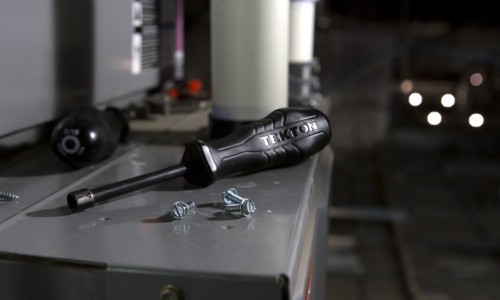While not all Arizona homeowners have a furnace, for those who do, short cycling can be a pain. Just like a short cycling AC, if your furnace is malfunctioning like this, it won’t be able to keep you comfortable in the winter.
Noticing your furnace kicking on and off more frequently than it should? It’s probably a sign of short cycling. Don’t worry – it’s more common than you think. In this post, we’ll explain more about what that is and what causes it so you can get your heating system back in the game.
If you need to repair your system or want a professional’s opinion, contact River Valley and one of our certified HVAC technicians can take a look.
What is short cycling?
Short cycling, in the simplest of terms, is an HVAC term for when a furnace turns on and off in short bursts instead of running through longer, regular heating cycles. It’s like a sprinter taking off at full speed, stopping after a few seconds and starting up again.
Short cycling affects your home’s temperature and humidity levels, putting strain on your furnace and drawing more energy. It can be harmful to your furnace and, ultimately, your wallet.
What causes a furnace to short cycle? 7 Potential reasons
If your furnace starts acting funny, here are some possible reasons why:
Reason #1. Dirty or clogged air filter
Your furnace might be short cycling due to a dirty or clogged air filter. Just like a blocked nostril can make it harder to breathe, a dirty filter restricts the airflow to your furnace. This can cause your heat exchanger to overwork and overheat. It’ll turn off before it can complete an entire heating cycle.
Hence, it will shut off early and then start up again to compensate.
Reason #2. Thermostat issues
The thermostat is the brain of your HVAC system. It’s the command center that tells your furnace when to turn on and off. If your thermostat’s batteries are low, the power connection is unstable, the settings are incorrect, or the internal wiring is faulty, it can lead to miscommunications, causing your furnace to short cycle.
Reason #3. Air leaks
Air leaks in your ductwork or around your home can lead to multiple issues, including short cycling. When warm air escapes, your furnace overworks itself to maintain the desired temperature. With a significant leak (or multiple), your furnace may shut off prematurely before it heats your home completely, causing short cycling.
Reason #4. Faulty components
Faulty components, such as a malfunctioning ignition system, can lead to short cycling. For instance, if your ignition system doesn’t work properly, your furnace might struggle to ignite, causing it to shut off shortly after it starts up. Like a car with a bad ignition switch, your engine might crank on, but the car won’t start.
Your furnace is an intricate network of components – some systems are more complex than others. If a component stops working, it can trigger a domino effect and lead to short cycling.
Reason #5. Your furnace is too big for your living space
While having a bigger furnace may seem like a good idea, it can cost you in the long run. A furnace that’s too big for your home will heat your home too quickly and shut off early. It’s like trying to run a marathon at a sprinter’s pace; you’ll get far at the beginning, but then you’ll be too tired to continue.
Reason #6. Dirty or damaged flame sensor
The flame sensor is a crucial furnace safety feature. It detects whether a flame is present when gas is flowing. If it’s dirty or damaged, it may not sense the flame, causing the gas valve to close and the furnace to shut off, leading to short cycling. It’s the equivalent of a smoke detector that goes off even when there’s no fire.
Reason #7. Clogged flue or exhaust pipe
A clogged flue or exhaust pipe can also lead to short cycling. The main role of this pipe is to safely remove the gas byproducts produced during combustion. If the pipe is clogged, the gasses can’t exit, and the furnace may overheat and shut off too early.
Regular inspection and cleaning can help prevent these issues, ensuring a better furnace and a more comfy winter season. In an emergency, it’s important to have someone you can trust. Our company has emergency hours every day of the week, so you don’t have to worry about getting stuck in the cold.
For reliable HVAC services, contact River Valley Air Conditioning.
How to prevent short cycling
The best way to stop your furnace from short cycling is to prevent it in the first place. By having a professional install your unit, you’ll know it’s the right size for your home, and everything is connected properly.
Regular professional maintenance also can help keep your furnace components clean and operating smoothly. Consider investing in a maintenance plan for your convenience to make sure your system is always on track.
Professional installation and maintenance of your furnace system is the key to preventing short cycling. We specialize in all of the above, saving homeowners in Bullhead City, AZ, from unwelcome chills and high electricity bills. For the best services in the city, we’re just a call away.
Troubleshooting short cycling issues
If your furnace starts acting up, try these troubleshooting steps:
- Check and replace the air filters: Air filters are the lungs of your furnace. If they’re clogged or dirty, they can hinder your system’s effectiveness. Replacing the air filter can be a simple, effective first step to resolving short cycling and other problems.
- Check your thermostat settings and location: Incorrect thermostat settings or a poor location can cause miscommunications with your furnace, leading to short cycling, among other issues. Make sure your device is set to the right settings, has fresh batteries, and is located away from drafts, direct sunlight, or any heat sources.
- Clear any obstructions in the flue/exhaust pipe: In addition to your air filter, any blockages in the flue can cause your furnace to shut off prematurely. Inspect your flue pipe for any obvious obstructions, like debris or nests, and remove them if it’s safe to do so.
- Inspect the flame sensor for dirt or faults: If your system’s flame sensor is dirty or broken, it might not detect the flame even when the gas is flowing, leading your furnace to shut off. Cleaning the sensor or resetting it might resolve the problem.
While these steps might help address minor short cycling issues, significant problems, especially those related to ignition or gas pressure, should always be left to a professional technician.
Pros have the tools, training, and expertise to diagnose and fix these complex issues safely and effectively. So, if your DIY efforts have not resolved the problem, call the experts.
Call the best furnace service technicians in the tri-state area.
Short cycling is actually a common issue for homeowners. But, with professional installation and regular maintenance, you can prevent it. The team at River Valley Air Conditioning, Inc. is committed to ensuring your home in Bullhead City, AZ, is warm and cozy, even in the harshest winters.
Don’t let furnace problems leave you out in the cold. Contact us today and experience peace of mind knowing your heating system is in expert hands.

